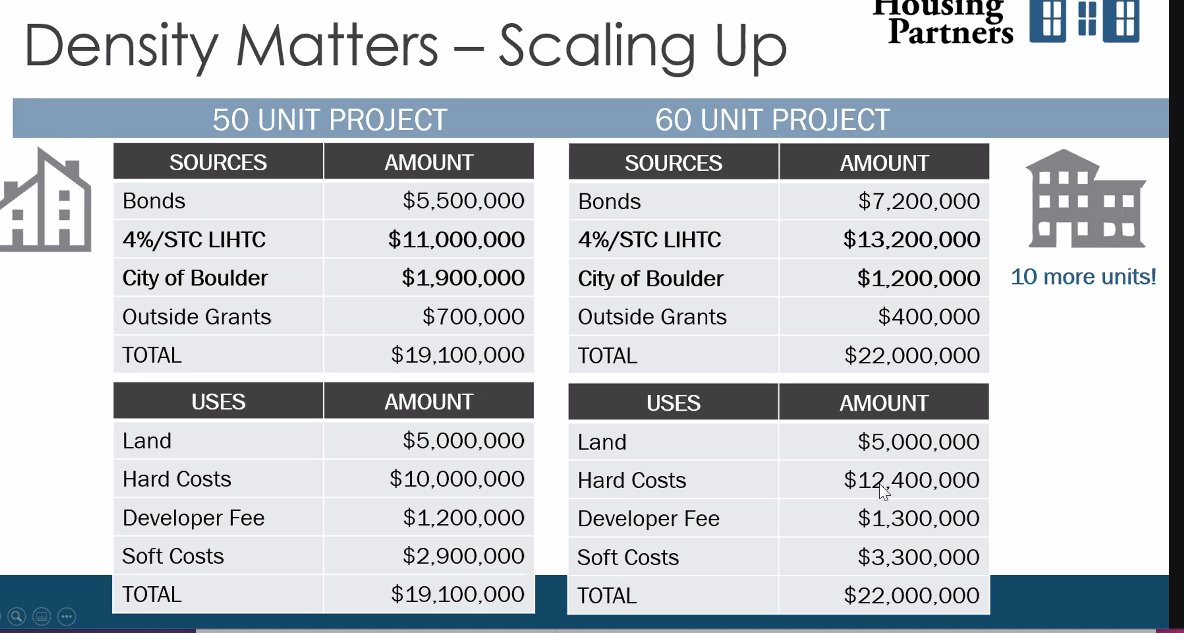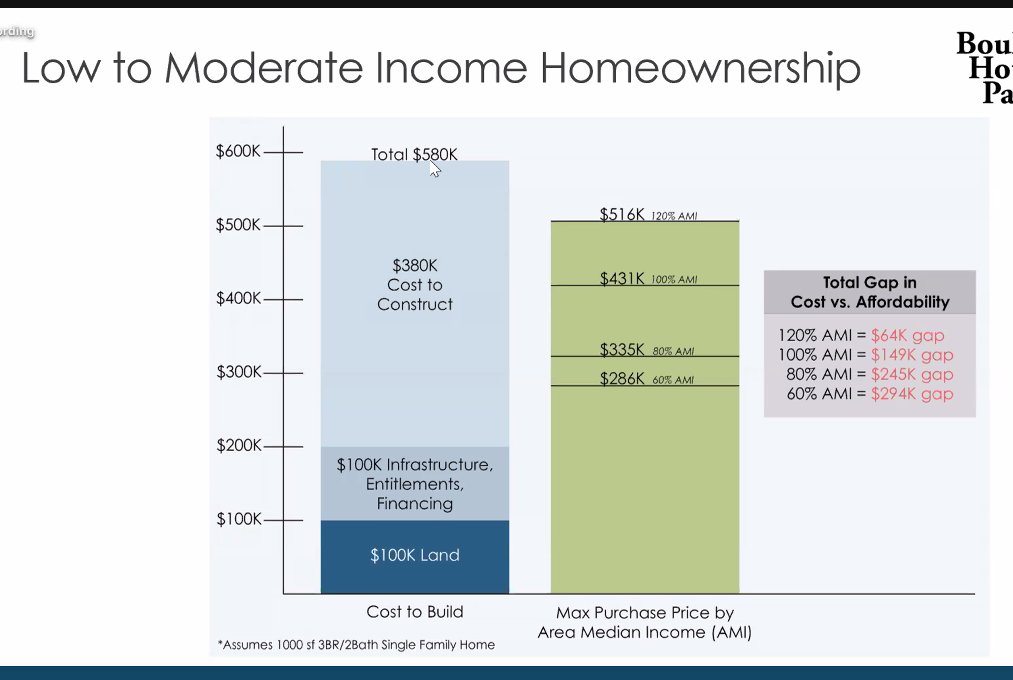
Boulder Planning Board is kicking off its affordable housing finance and development study session. I'm here to learn along with the board, and of course to report on their reactions.
Boulder's permanently affordable housing goal is 15% of all units by 2035. We're at 8.4%, or ~3700 units as of 2020. There are additional 971 units 'in the pipeline'.
Fun fact: Most new affordable *ownership* housing stock is added to the city through annexation.
2015-2020 affordable housing funding: 49% from cash-in-lieu, 24% property taxes, 16% federal funding, 11% commercial linkage fees.
For every local dollar of affordable housing funding, city/partners can leverage $2-3 in external funding.
Most people notice new construction, but city also spends affordable housing dollars acquiring and rehabbing existing units (e.g. Tantra).
Sarah Silver: Is there a difference in how city works w/ non-profit vs. for-profit affordable housing providers? Answer: Distribution is competitive.
Silver: Is oversight different between non-profit and for-profit providers? Answer: No.
John Gerstle: How does the city decide which projects to support?
City provides 'gap' funding. Developers have to have some funding already, city wants to see that a project is viable.
Gerstle wants to see the criteria city uses to distribute funding. I'm sure that's light reading.
Trends: In last 5 years, 19 of every 100 new homes developed were permanently affordable. And for that 100, 17 existing units were acquired/preserved as affordable housing.
Sarah Silver digging into on-site vs. cash-in-lieu affordable housing. What is the housing department's philosophy? Answer: It's a balance. Both approaches have benefits.
Cash-in-lieu contributions are ~$120K/unit - much higher than they were when this controversy started.
City staff: Affordable projects are held to a higher standard. This slide showing how their approval processes compare to market-rate is 👀👀👀 

Gerstle: What options exist beyond our current affordable housing approaches?
City staff: Through the 1990s, we talked about limiting home size, helping people with downpayment. In 2000 Boulder decided to focus on deed restrictions...*but* we could do a lot with the land use code. Duplexes, triplexes, fourplexes are significantly more affordable.
Gerstle: What impact would occupancy limits (@BoulderBedrooms) have, both short- and long-term?
Jay Sugnet (city staff) recounting Boulder's effort to legalize *seniors* sharing housing. Which sparked huge resistance. Of course.
Dodging the question about occupancy limits outcomes (it's too complex), but speaking broadly in support of the concept. This feels brave from city staff.
Lisa Smith asking about the amount of affordable housing stock that is condo/multi-family. Does that lead to service gaps or people leaving the city when they have other needs?
Smith suggests exit interviews for people leaving Boulder's affordable housing programs. Anecdotally, she's heard lots of (young) people leave the city.
Boulder Housing Partners presenting now. They manage ~1600 housing units in the city, and also administer ~1350 federal housing vouchers.
Median income of BHP households is $15,684. 74% of resident households earn less than 30% of area median income.
BHP does manage some market-rate housing, a relic of a time they had to underwrite public housing (which did not generate rent to cover operating costs).
BHP invests new construction, acquisition of existing housing, land banking, renovation. Also partners with for-profit developers who need to do an affordable housing component.
Funding: The 'gap' between what it costs to build an affordable unit in Boulder and the income it generates is large. Tax credits for private investors (e.g. LIHTC) is a way to bridge it.
Even after all of these inputs, there's often still a gap. Which is where city funding comes in.
TIL there are different pools of LIHTC credits. They generate between $120K and $280K per unit of housing. 

Tax credits are distributed competitively by state agencies. In Colorado, that's the Colorado Housing Finance Authority (CHFA).
BHP only applies if a project is already entitled/authorized by Boulder (which means a significant investment in design/process).
BHP only applies if a project is already entitled/authorized by Boulder (which means a significant investment in design/process).
Gerstle: Can changes be made to a project *after* tax credit financing is approved? Answer: Not much. That's why BHP tries to go through full city approval process first.
And additional units increase how much housing tax credits can leverage (city investment and private grant requirements reduced). 

Jorge Boone is unhappy about density in the previous slide. Does actual density matter, or just the number of units?
The example compared 50 vs. 60 homes with the *same underlying land costs* so...DENSITY DOES MATTER.
The example compared 50 vs. 60 homes with the *same underlying land costs* so...DENSITY DOES MATTER.
BHP determines unit mix (size and affordability level) based on market analysis, *not* on financial tools available.
More than 70% of Boulder renter households are 1-2 people. And 70%+ of households earning 60% area median income or less are 1-2 people.
Sarah Silver points out Boulder's large student population. Wants to know age breakdown on these numbers.
BHP's numbers are from market analyses done for their specific projects, and include *eligible* renters - which means students are excluded (Silver wants this confirmed).
Vacancy rates are lower for studio/1BR than 3BR units (5.8% vs. 8.7%). Boone wants to know why: Maybe the 3BRs (condos???) don't meet people's needs?
I hear the 'family-sized unit' argument bubbling up, so note that BHP is providing 3BR+ rentals at a higher rate than private developers!
Jorge Boone holding out hope that attached homes (townhomes) require less subsidy? Sure, a bit. BHP notes that 'stacking' brings costs down even more...
BHP: One difference between single-family and multi-family for affordability is there is no funding source (i.e. tax credits) to cover the gap for single family.
Silver: What else can we do?
BHP: We could look at land use...
...Also, how do we best spend our money? Big sums on single units in existing neighborhoods or smaller sums on lots of units in a separate location?
BHP: We could look at land use...
...Also, how do we best spend our money? Big sums on single units in existing neighborhoods or smaller sums on lots of units in a separate location?
Gerstle: What are the pros and cons of vouchers vs. project-based affordable housing?
BHP: Options for people are best. Both are tools.
BHP: Options for people are best. Both are tools.
Gerstle: Should the city be interested in participating in voucher programs? Or should it focus on project-based housing?
City staff: If the question is if city should be using funds to directly subsidize rent, then no. We want to use money to create an affordable asset.
City staff: If the question is if city should be using funds to directly subsidize rent, then no. We want to use money to create an affordable asset.
Sarah Silver: Questioning the data tables on eligible households: "There are lies, damn lies, and statistics." She's clearly looking for something specific, but I'm not following.
Seems to be about trends...Gist of the answer is that numbers of BHP-eligible households has grown in the last decade.
No further discussion. I'm disappointed to have not heard from Lupita Montoya, who has been skeptical of BHP in the past. She appeared briefly, but is traveling, so maybe not fully with us.
Anyway, back to full-contact meetings next week with a discussion of Boulder's community benefit program, aka how to get permission to build to the charter height limit in 537 simple steps.
• • •
Missing some Tweet in this thread? You can try to
force a refresh












